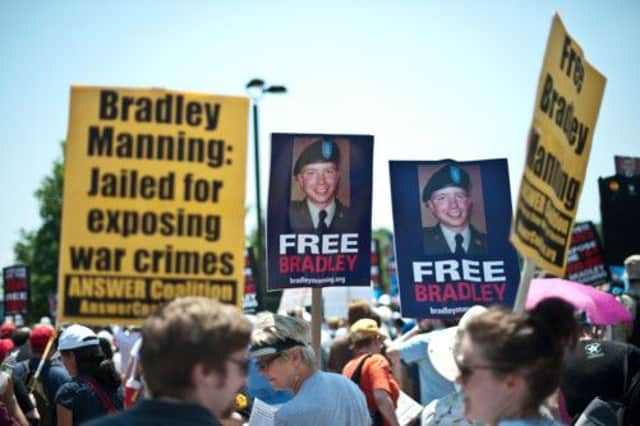Wikileaks: Bradley Manning ‘naive’, court told


• Manning said he leaked the material to expose the American military’s “bloodlust”
• US officials have said the cables sent to WikiLeaks endangered lives and national security.
Advertisement
Hide AdAdvertisement
Hide AdPrivate First Class Bradley Manning’s attorney, David Coombs, gave his opening statement after prosecutors said the 25-year-old former intelligence analyst – who faces life in prison if convicted – released thousands of sensitive documents that fell into enemy hands.
Prosecutors said they would present evidence that Osama bin Laden asked for and received information given to WikiLeaks. Captain Joe Morrow, a prosecutor, said during his opening statement: “This is a case of about what happens when arrogance meets access to sensitive information.”
Manning’s supporters – who include film-maker Michael Moore and actor John Cusack – hail him as a whistleblowing hero and political prisoner. Others say he is a traitor.
“This is a case about a soldier who systematically harvested documents from classified databases and then dumped that information on to the internet into the hands of the enemy,” Capt Morrow said.
Manning has chosen to have his court martial heard by a judge instead of a jury. The case is expected to run all summer.
In February, Manning told military judge Colonel Denise Lind he leaked the material to expose the American military’s “bloodlust” and disregard for human life in Iraq and Afghanistan. He said he did not believe the information would harm the US and that he wanted to start a debate on the role of the military and foreign policy.
The judge accepted his guilty plea to reduced charges for many of the alleged offences, but prosecutors moved forward with a court martial on other charges.
The case is the most high-profile for so far for President Barack Obama’s administration, which has come under criticism for its crackdown on leakers. The six prosecutions since Mr Obama took office is more than all other presidencies combined.
Advertisement
Hide AdAdvertisement
Hide AdUS officials have said the more than 700,000 Iraq and Afghanistan battlefield reports and state department cables Manning sent to WikiLeaks endangered lives and national security.
The material WikiLeaks began publishing in 2010 documented complaints of Iraqi detainee abuses; a US tally of civilian deaths in Iraq and America’s weak support for the government of Tunisia – a disclosure Manning supporters said encouraged the popular uprising that ousted the Tunisian president in 2011 and helped trigger the Arab Spring.
Manning also acknowledged sending WikiLeaks unclassified video of a 2007 US Apache helicopter attack that killed civilians, including a Reuters photographer. An internal military investigation concluded the troops reasonably mistook the camera equipment for weapons; WikiLeaks dubbed the video “Collateral Murder”.
The release of the cables and video embarrassed the US and its allies. The Obama administration has said the moves threatened valuable military and diplomatic sources and strained America’s relations with other governments.
SEE ALSO